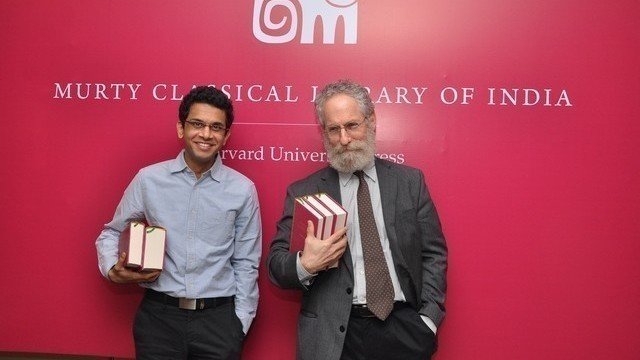To sum up the story so far: Rohan Murthy, son of ‘Infosys’ Narayan Murthy, spearheading Murty Classical Library, an initiative to translate 500 volumes of traditional Indian literature into English, has refused to consider removal of Sheldon Pollock as the mentor and chief editor of the project.
"It is quite rich to sit in the peanut gallery, pass comments and throw empty shells at those who are actually rolling their sleeves up and working on the ground," said Rohan of those 132 academicians and intellectuals petitioning them to reconsider their decision.
Many Hindus do not grasp the enormity of what’s at stake here and join the chorus to brand any indigenous attempt to question West’s stranglehold on Hindu academics as Hindu chauvinism (or is it Hindu nationalism of late?).
Intellectual Colonialism
One of Rajiv Malhotra’s important points again comes to fore: other religions are “defined” by their practitioners who empathize with their religion’s inner-view and worldview. Critics, even those espousing legitimate concerns, are not allowed to “define” the core-religion.
For example, Christianity is taught about as being about love, sacrifice, redemption through faith etc, as defined by its practitioners. Its role in other darker areas like racism, colonialism, brutal conversions etc. are noted, but they are seen in socio-economic context and are not tied up with Christianity’s core. Islam, taught from a Muslim’s vantage point, is a religion of peace and jihad is about internal struggle (notwithstanding the current state of affairs!?), and the critics are not allowed to challenge this core.
However, the same agency is denied to Hindus. Apparently, casteism is the foundational-rock of Hinduism, Hindus worship violent Gods, Sanskrit was a tool of oppression against lower castes, Aryans were foreigners who invaded India, and contemporary Hinduism never existed before British. These ideas, now deified as settled facts, were propagated by westerners, who, among other things, never experienced Hinduism as an insider.
Further, these scholars, instead of sticking to their focus area and historical timeline, extrapolate their findings to present and vehemently criticize contemporary Hindu efforts to organize themselves.
Why shouldn’t practicing Hindus not have a stake over what Hinduism is about?
But they devoted their lives to study!
Westerners’ involvement in anything Indian is unfortunately taken as a badge of honor. Any active proponent of quasi-spiritual sects/missions would not fail to bring in their western disciplines as proof of their path’s effectuality. Any western interest, irrespective of the motives involved, is received with gratitude, as if we are happy to be an object of their study itself (we, probably, hold ourselves beneath western gaze, so we are ecstatic when it happens!).
Rohan Murthy’s quote is emblematic of this attitude. Devoting oneself to study doesn’t automatically translate into empathetic understanding of the subject. As a matter of fact, I’ve seen some Christian pastors who have dedicated themselves to deeper study of Hindu scriptures than most Hindus themselves; but with a motive of discovering fault-lines that enable improvised soul-harvesting efforts.
Of course, most scholars do not have this end in mind while studying – their motives are indeed noble. It’s possible that their works were later appropriated by those with vested interests. Also, one should not rule out subtle in-built bias in these scholars’ mind due to their conditioning, because of which they are genuinely unable to appreciate the matter from different (native’s) perspective. Ascribing motives doesn’t take the debate anywhere.
The point of contention here, however, is Hindus must be allowed to define their practices, traditions and culture as they see it. And while outsiders’ perspective is welcome for constructive criticism, they cannot be allowed to have a carte blanche on Hinduism Studies.
A quick glance of some of Pollock's views on Hinduism, far from putting our concerns to rest, further exacerbates our apprehensions about the nature of the translation works-in-progress. Given the overall patronizing tone and bias, is it totally beyond the realm of possibility that such biases wouldn’t continue to creep into his upcoming works?
The larger battle
Since Murty Classical Library is funded by a private business family, Rohan Murthy is well within his rights to shut down any request. What, however, needs deeper introspection is why we have allowed things come to this pass! Where, we do not have the necessary ecosystem and infrastructure to have homegrown institutions to do this very job.
Given that investing in western universities brings prestige, it’s hard to begrudge our businesspeople who line up to do it. It may even be a purely business decision. Obviously, they may also cite lack of institutional expertise (which, sadly is true) in their support.
However, the question is why haven’t we invested to build such institutions? Through much less capital, but more time and long-term commitment, India may have had many institutions to perform such works with greater fidelity, accuracy and homespun narrative.
Cultural branding has real-business implications. India should not squander its cultural wealth by outsourcing it to foreigners (the ominous parallel to East India Company is hard to miss!). Koenraad Elst's "Decolonizing the Hindu Mind" also makes a point about Hindus not investing in building the requisite intellectual capital to rigorously debate and withstand the sophisticated attacks by Christian evangelists and Leftists.
Its about time that India does this.

Comments
Post a Comment